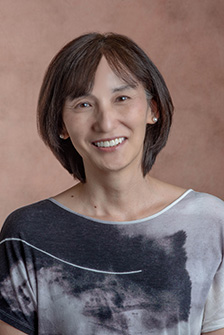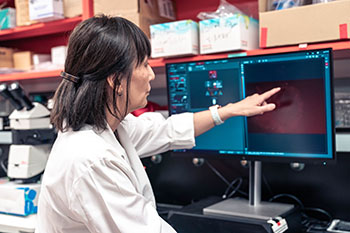
Momoko Yoshimoto, MD, PhD, firmly believes that research moves the world forward.
As a professor in the Department of Investigative Medicine and researcher in the Center for Immunobiology at Western Michigan University Homer Stryker M.D. School of Medicine (WMed), Dr. Yoshimoto is actively involved in this movement as her research explores how blood cells develop in mouse embryos, with a particular focus on the emergence of hematopoietic stem cells (HSCs) and progenitor cells from specialized endothelial cells known as hemogenic endothelial cells (HECs).
"Through research, we are working to discover something important that is not known in the world,” Dr. Yoshimoto said. “In my lab specifically, our final goal is to understand how the first blood stem cells are produced in the mouse embryo. That knowledge can then be translated into human research.”
Dr. Yoshimoto’s research path is motivated by her prior clinical experience as a pediatric hematology/oncologist in Japan. During this time, Dr. Yoshimoto was involved in dedicated care for pediatric leukemic patients through chemotherapy and stem cell transplantation, fueling her passion for advancing hematology research. This pursuit led her to earn a PhD from Kyoto University Graduate School of Medicine in 2003.
In 2005, Dr. Yoshimoto joined the lab of Mervin Yoder, MD, at Indiana University School of Medicine as a postdoctoral researcher. Her groundbreaking work there unveiled the solid evidence of lymphoid potential in the extra-embryonic yolk sac of mouse embryos. She was appointed research assistant professor in 2011, securing multiple grants in 2015 and 2016. This led her to be recruited as an associate professor at the Center for Stem Cell and Regenerative Medicine at McGovern Medical School, University of Texas Health Science Center at Houston, where she established her laboratory.
Dr. Yoshimoto was recruited to WMed in September 2023, bringing her extensive expertise and securing her second R01 grant from the National Institutes of Health (NIH) along with a new R21 grant. She was promoted to full professor in July 2024.
At WMed, Dr. Yoshimoto’s lab is currently supported by Michihiro Kobayashi, MD, PhD, assistant professor; Hitomi Ura, MD; Yosuke Okumura, MD; Shashvat Joshi, MD; and Shun Yonehara.
Current projects in Dr. Yoshimoto’s lab include:
- Determining the hematopoietic lineage trees from endothelial cells in the embryo to adult mice.
- Determining the possible different functions between fetal-derived and HSC-derived B cells.
- Identifying the earliest innate lymphoid progenitors that seed the lamina propria of the intestine.
- Determining the preventive role of B-1 cells against atherosclerosis
- Examining the hematopoietic niche in the fetal liver in mice and humans.
- Inducing functional B cells from mouse and human pluripotent stem cells.

While her research is not directly tied to clinical outcomes, Dr. Yoshimoto notes her work has the potential to have substantial impacts on patient care. This is particularly true in her lab’s ongoing research toward generating functional B-cells and Hematopoietic Stem and Progenitor Cells (HSPCs) from human inducible pluripotent stem cells (iPSCs). This project holds promise not only in comprehending the development of hematopoietic cells in human embryos but also in pioneering immune cell therapy using innate lymphoid cells derived from human iPSCs.
“Due to mismatches in blood type, there is constantly a shortage of donors, so many patients cannot receive bone marrow transplantation therapy,” Dr. Yoshimoto said. “If we can successfully make blood stem cells from human inducible pluripotent stem cells, then we can solve the problem of a shortage of donors, not only for patients with blood cancers, but for patients with other diseases as well.”
